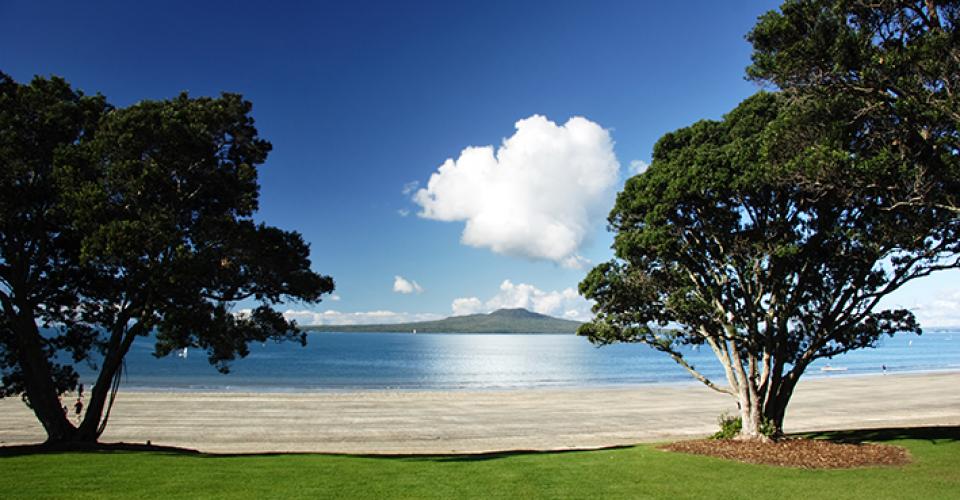Videos help with assessment: teacher and student perspective
14/05/2014Matt Nicoll prepares his students for NCEA assessment using online tools.
 Science teacher Matt Nicoll is using innovative ways to prepare his students for upcoming NCEA assessments. Matt, who teaches chemistry and science at St Andrew’s College in Christchurch, uses technology and social media to engage with fellow teachers and his students.
Science teacher Matt Nicoll is using innovative ways to prepare his students for upcoming NCEA assessments. Matt, who teaches chemistry and science at St Andrew’s College in Christchurch, uses technology and social media to engage with fellow teachers and his students.
At the end of the first term, Matt’s year 13 chemistry students asked for more help with an assessment task. “They said ‘when we were going over the work in class, we wish we could have videoed your lesson, so we could revise it again during the holidays,’ so I made a plan to create some video resources,” says Matt.
“It does take a bit of confidence to say ‘okay, I’ll have a go at making something,’ and then to actually do it,” he says. He uploaded the video resources in the last week of the school holidays, to make sure he didn’t spend the entire fortnight thinking about chemistry assessment. The chemistry video clips ‘walk’ students through their upcoming assessment. “All I’ve done is put a ‘voice’ to it, and a ‘graphic’ to it, as it were, on my computer, and videoed it. I talk through the marking schedule, along with a commentary, or thought process about how you get there,” he says.
Sharing learning through an online community
Some of Matt’s students instigated a Facebook community for their year group, and links were also posted there, for easy access. Bradley Atkinson, who formed the group, gives a student perspective below.
Matt admits it’s useful to have such resources available for future classes, too. “The best thing about it is, next year I will be able to use it again for my new students, and it’s good to have a resource bank like this in case it’s needed.” Each time a new concept is taught in class, Matt records the lesson. “I actually video everything I teach, and I want to continue to do that because it’s nice for students to have a record of ‘their’ lesson, complete with their own exemplars,” he says. "Obviously, not every class is about teaching concepts, but when I do, I record the lesson and put the link up on the student Facebook page.”
Student viewing patterns can be easily tracked by checking the YouTube ‘views’ of each video clip, says Matt, and he is more than happy for other teachers to make use of his clips. “Because they’re now out in the public domain, I’m happy for other teachers to use the resources, if they want to.”
‘Future-proofing’ after a disaster
The initial motivation to consider the creation of an online resource bank was the 2011 Christchurch earthquake, says Matt. “I don’t know if I’d be doing this work without having had the earthquakes take place here. For example, Saint Andrew’s was shut for a month, which makes up a huge percentage of the academic year. Yet, there was still an expectation that we would provide some sort of tuition. “I remember thinking at the time, ‘if only I had a library of videos of me teaching some stuff or some other online resources I could just send students to, that would make life much easier.’”
Christchurch schools forced to close during this period were given free access to Te Kura – The Correspondence School educational material. “It was brilliant to have that access, but I also had a feeling that it would be great for my students to be able to learn from a familiar voice, and one that tapped in to earlier work we had covered,” he says.
“My students know my style, they relate to my examples and exemplars, they’re the ones that I have been working for. So after the earthquakes, because of the high levels of unpredictability, I had this idea of ‘future-proofing’ my classes. What happens if we are shut again? What happens if the school has to be shut down for strengthening work? Will we cope with our academic work?”
These thoughts led Matt to collaborate with the ICT director at his school. “We were looking at things like Moodle as a learning management system, and so the earthquakes were in a way a catalyst for thinking this way.” His assessment video work is just a continuation of this ‘future-proofing’ theme, he says. “It isn’t really a paradigm shift for me, or a change in my philosophy about preparing for assessments; it is just a response to student needs.”
Visit Matt’s blogs, complete with links to the YouTube videos here.
You can read more about Matt’s approach to using technology in his teaching in here on New Zealand Science Teacher.

Student perspective: Bradley Atkinson
Hi Bradley. What’s your perspective on using videos like these to prepare for assessments?
I personally find it very helpful and I know a lot of other students do as well. If we ever feel as though we haven't fully understood a concept in class, these videos are a resource that we can always go back to and spend time reviewing in order to understand the concept better and take notes.
I also find that these videos are helpful for external standards as they can refresh our memory closer to exams and offer an alternate way to review notes rather than simply reading and writing.
Is there anything about using the videos that you find challenging?
The only challenge that I find typically comes hand-in-hand with online educational videos is that it is often quite hard to ask questions. There isn't the same personal interaction as one would have in a class. However, Mr Nicoll gets around this problem as he always finds time during school time to answer questions and is quick to respond to questions online.
You also administer a Facebook page for your fellow Year 13 students. Can you tell me a bit about the way you and your fellow students use social media for school-related stuff?
I'm not actually the administrator of the page. However, every Year 13 student at our school has access to the page and is welcome to post on it. I've found that most of the posts tend to be related to school work, such as asking other students when assessments are due, sharing exemplars for upcoming assessments, etc.
It's really quite a good way for our year group to communicate with each other, we can ask an entire group of students a question and get a quick response. Most classes also have their own Facebook pages which students use to ask for help with questions, I've never seen any posts that are asking for help with writing an internal or with assignments or anything of that nature so to me it doesn't seem as though people are abusing this connectivity.
I only created a Facebook for education purposes. As part of my leadership position at St Andrew's, I need to communicate with various of students of different year groups and I find it very easy to do this through Facebook.
There is some degree of communication between teachers and students on Facebook, however, in my opinion, there's not enough. Some teachers like Mr Nicoll have a 'school' Facebook account that they use to communicate with students, which has shown to be quite useful, and I feel as though more teachers should follow this path. All in all, the way that our year group has come to use Facebook has shown to be quite beneficial, it seems as though we can all easily, and responsibly share information relevant to our education through Facebook.
I'm also aware some students are using Reddit for study and reading up on concepts, and from what I've heard, it has also been quite a useful tool for study, however, I've not had enough experience with this site to make a personal comment on it.
Anything else you want to add about learning from online videos?
I tend to spend a lot of time studying, and find online videos very useful, especially in explaining concepts when I'm either getting ahead of the class or preparing for an assessment, educational videos have proven to be a very useful tool for me. Whether I'm viewing 'Khan Academy', 'Minute Physics' or Mr Nicoll's YouTube channel, I find these videos very useful in preparing for assessments as they offer videos with very relevant and useful information in them.

























Post your comment
Comments
No one has commented on this page yet.
RSS feed for comments on this page | RSS feed for all comments